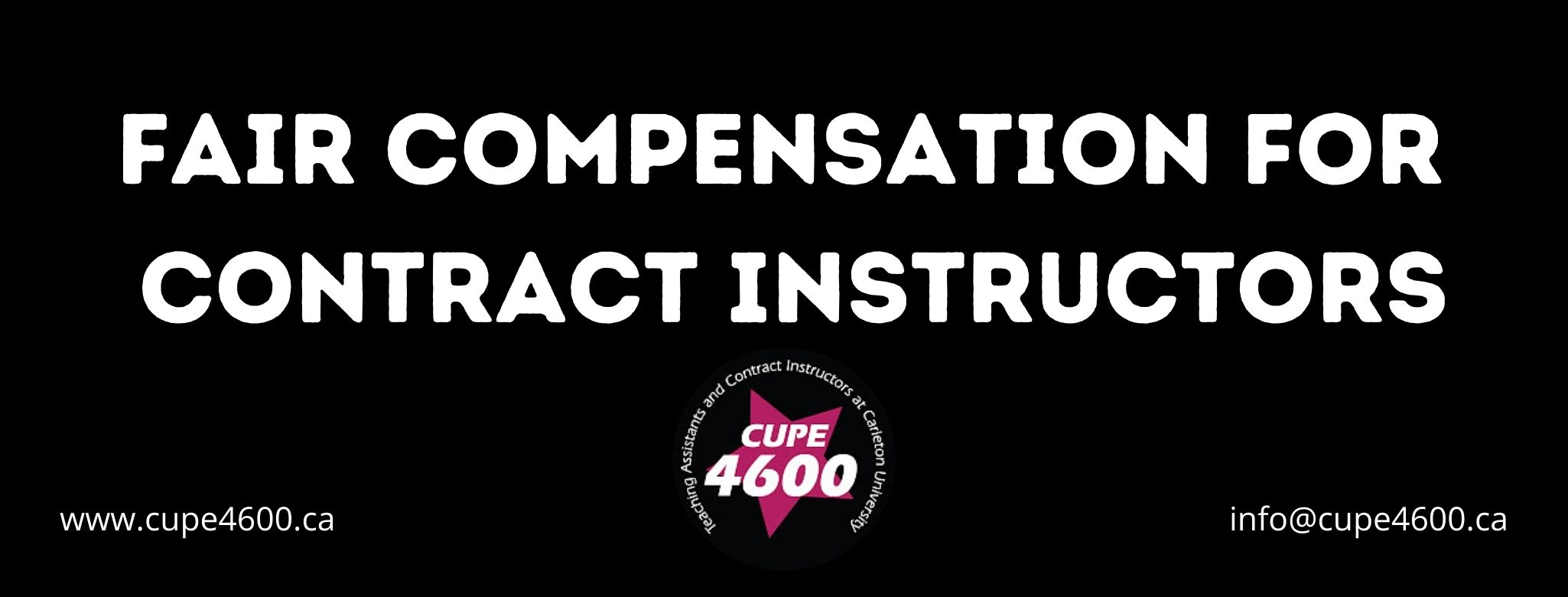Dear President Benoit Bacon and Provost Jerry Tomberlin,
On behalf of nearly 3,000 TAs and Contract Instructors (CIs), the executive board of CUPE 4600 calls on you to direct Carleton University’s administration to deal fairly with its workers and adequately address and compensate the hundreds of CIs for the additional hours they have worked to deliver a successful academic year in the midst of the COVID-19 pandemic.
You and many others in the academic community have remarked on the reality that these are “exceptional times.” No less exceptional has been the tireless work of CIs to deliver to the 32,000 undergraduate and graduate students at our institution a meaningful, engaging teaching and learning experience, despite the challenges of remote learning. In spite of being systematically underpaid and overworked even before this pandemic, CIs have risen to the task, learning how to use new technologies and applications, transforming entire courses, and establishing new ways of assessing and supporting students, often in a matter of mere weeks.
In the course of this incredible effort, many CIs have accumulated overtime hours that the Carleton administration refuses to acknowledge or compensate. In an internal survey of our membership, for instance, 98% of Carleton’s CIs reported having to seek out training and knowledge to help them redesign and facilitate their courses. Nor is training the only source of additional work. Since the early days of the pandemic, the University has advocated for asynchronous and blended approaches to teaching that require instructors to record content and build online activities that must be available to students earlier in a term. Assessment in an online context is also considerably more laborious. Whereas instructors in a pre-pandemic context could rely on a Scantron machine to process multiple-choice examinations, for instance, they now must build individual questions and answers in question banks that require considerably more time to produce. Because instructors cannot easily have any meaningful proctoring over the students writing—and, in fact, the University has in part advocated against such proctoring—they must now create question banks that have over three times the number of questions that the students will face on the exam, so as to minimize opportunities for cheating.
It should be apparent that these tasks, all of which without the University would have been unable to deliver its academic programming, constitute additional labour. Carleton administration, however, insists that teaching online is merely “different, not more” work. This is a deflection, and a patently dishonest one. As you are well aware, in October 2020, the Deans contacted all instructors in their faculties, inviting them to provide written feedback about their experiences teaching online. The responses from almost every instructor in every faculty—from CIs and from the full-time instructors represented by the Carleton University Academic Staff Association (CUASA)—communicated, clearly and in detail, that instructors were experiencing significant, unsustainable increases in their workloads. In some faculties, the feedback prompted an emergency ‘town hall’ meeting to see what could be done to address the workload concerns of Carleton’s instructors, with one outcome being a reduction in teaching loads for some CUASA members. Our demand is simply that Carleton apply the same standard to its CIs.
While the University boasts publicly that we are “all in this together” and flaunts additional Teaching and Learning Services (TLS) and Scheduling and Exam Services (SES) supports, these supports do not address our core concern, and they have not meaningfully reduced the work required of instructors. Instructors are the content experts, and we are ultimately responsible for building our own courses. While it is helpful to be able to consult with someone, for instance, to clarify how to transition a given assignment or activity into the online environment, it is, in the end, the instructors who must design, build, and test it to ensure that it works. Instructors must also play the role of on-call IT support for their students throughout the term.
Our demand for compensation is exceptional, outside of a normal bargaining year, but these are exceptional times and our membership has made exceptional efforts in the form of additional training and labour to keep the institution running. We therefore call on you and all relevant members of Carleton’s administration to engage with us in good faith in acknowledging and addressing the reality of the monumental contribution of our membership.
In 2018 and 2019, the University paid out $1.552 million to senior administrators who stopped working at Carleton in mid-2017, and it has a reserve fund for use precisely in emergencies such as COVID-19 with millions of dollars. It is fully within the capacity of you and the University to give fair compensation to a group of workers that are absolutely essential to the continued functioning of Carleton University.
Your name
Your email

